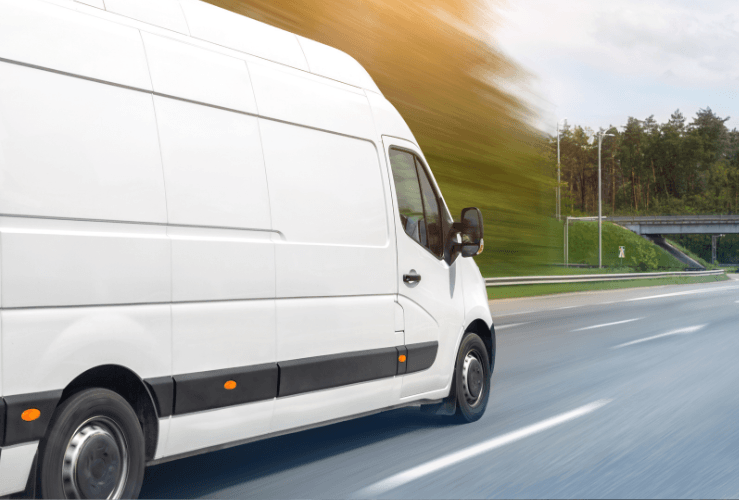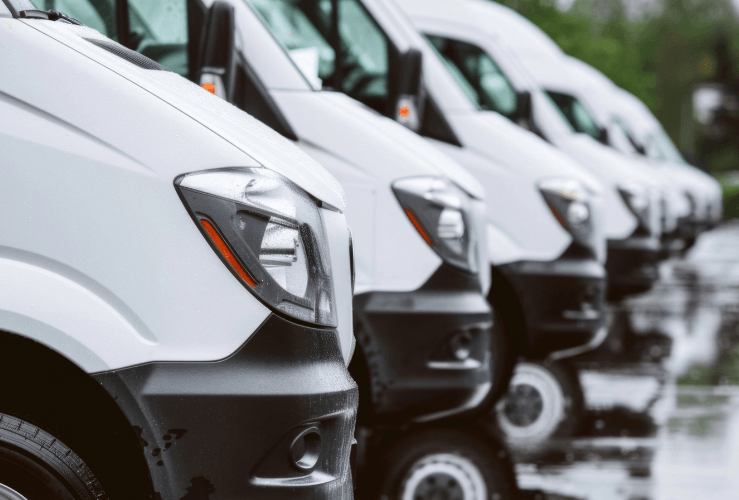A good fleet insurance policy will keep your business moving if one of your vehicles is involved in an accident or loss. It's important to choose a flexible policy that aligns with your current operations and business goals moving forward.
Fleet cover - or insurance for business vehicles - is designed to meet the needs of businesses and other organisations that operate two or more vehicles. It means you can cover all your vehicles under a single policy, which is far more convenient than having a policy for each vehicle.
Aside from convenience, you may pay less for one policy than you would for multiple policies. Some insurers offer discounts for each additional vehicle covered.
You can take out policies in the name of your company, the name of a partner, or the name of a company director.

What Vehicle Types are Covered?
When looking at insurance for business vehicles, it's possible to take out an 'Any Vehicle' policy which covers vehicles like:
- Vans
- Cars
- Heavy goods vehicles
- Motorbikes
However, these policies often exclude specialist vehicles like excavators and forklifts.
Business-Specific Fleet Insurance
Specialist policies are available for specific business types, including couriers, private hire (taxis etc.) and haulage firms.
What is Covered by Fleet Insurance?
When it comes to insurance for business vehicles, coverage varies depending on the policy you take out. But it can cover your vehicle and your drivers if they are involved in collisions/accidents or the theft of a vehicle.
Fleet insurance can also cover you against damage to other (third-party) vehicles if one of your drivers is deemed 'at fault'.
General Coverage: What to Look For
Here are some things you might look for in a policy:
- New vehicle replacement - this would cover a vehicle you bought in the UK as new against theft or write-off. Vehicle age limits normally apply.
- Coverage for installed audio, entertainment, and navigation equipment
- Legal liability cover for injury to other people caused by a vehicle in your fleet
- Replacement locks or ignition system after theft of keys
- Minimum coverage for driving in the European Union (if needed)
- Legal protection - giving you legal advice and cost coverage
- Vehicle recovery (for use after an accident)
Policy Add-Ons: What to Consider
Every business is unique and so you may need extra cover to protect against specific risks.
Depending on the insurer, you may be able to add extra services to your policy, such as:
- Tools insurance
- Employee liability cover
- Trailer insurance
- Courtesy car extension
- Public liability insurance
- Breakdown cover
- Goods in transit cover (theft, loss or damage of transported goods owned by another entity)
- No claims bonus protection

'Named Driver' or 'Any Driver'?
When looking for a suitable fleet insurance policy, it’s important to consider whether you need a 'Named Driver' or an 'Any Driver' policy.
Choose a Named Driver policy if you have a specific driver to cover.
Opt for an Any Driver policy if you have a roster of drivers. Note that in most cases this will cost more than a Named Driver policy (unless, for example, the Named Driver is deemed higher risk - by being aged under 25, for instance).
Ultimately, an Any Driver policy gives you much more flexibility.
What Doesn’t Fleet Insurance Cover?
Fleet insurance works in a very similar way to private car insurance. As such, there are risks that it won’t cover your business for. These include general wear-and-tear damage; loss of value over time; electrical/mechanical issues; loss/damage/theft of goods that are not insured; vehicle theft after keys were left in the ignition/inside the vehicle; theft after goods were left visible or out in the open.
You would also need to pay any excess - the amount you contribute to any claim.
Choose a Protection Level that Meets Your Needs
As with regular motor insurance, there are three cover levels to consider:
- Third-Party Only
Third-party only is the minimum legal requirement for driving and offers the most basic level of cover. This policy provides coverage for damage caused to other people and their property. - Third-Party, Fire, and Theft (TPFT)
This type of insurance covers everything included in third-party only, with the added protection of covering damage to your vehicle caused by fire or theft. - Comprehensive
Comprehensive insurance is the highest level of cover available. It includes all the benefits of third-party, fire, and theft policies, with additional protection for your drivers and your vehicles.
Why Comprehensive Cover Could be Cheaper
It doesn't seem logical to say that comprehensive cover is cheaper than Third Party or TPFT but this is often the case.
Holders of Third Party/TPFT insurance are deemed higher risk than those with comprehensive cover.
Adding and Removing Vehicles
It's sensible to choose a policy that allows you to add and remove vehicles as your business grows and changes.
Amending Coverage
It's also prudent to select a policy that enables you to change the level of cover as required.

Choose a Policy that Can Grow with Your Business
Fleet insurance policies vary in terms of how many vehicles they can cover.
If you're planning to grow your organisation, it’s important to select a policy that can expand with you. For example, if you plan to increase your fleet from 50 to 100 vehicles over the next year, you need a policy which will cover this higher number of vehicles.
If you manage a larger fleet, you may need to use a specialist broker in order to find a suitable policy.
Keep Your Insurer Updated with Any Changes
It's critical you tell your insurer about any changes to your covered fleet and/or drivers.
Insurance firms need to keep the Motor Insurance Database (MID) updated at all times. This organisation was set up by the insurance industry to help combat vehicle crime.
What to Look for in a Specific Insurer
Things to look out for in a good insurer include:
- Heritage: Is the insurance underwritten by an established provider?
- Loyalty Bonuses: Do they give you a discount for continued custom over the years?
- Other Services You Might Need:g., SME business cover; commercial insurance; and risk management services
Peace of Mind For Your Business
A good fleet insurance policy will give you the peace of mind that if the worst happens, you'll be protected and you'll be able to continue trading.
With this in mind, it’s important to fully understand what is and isn’t included in your fleet insurance policy.



